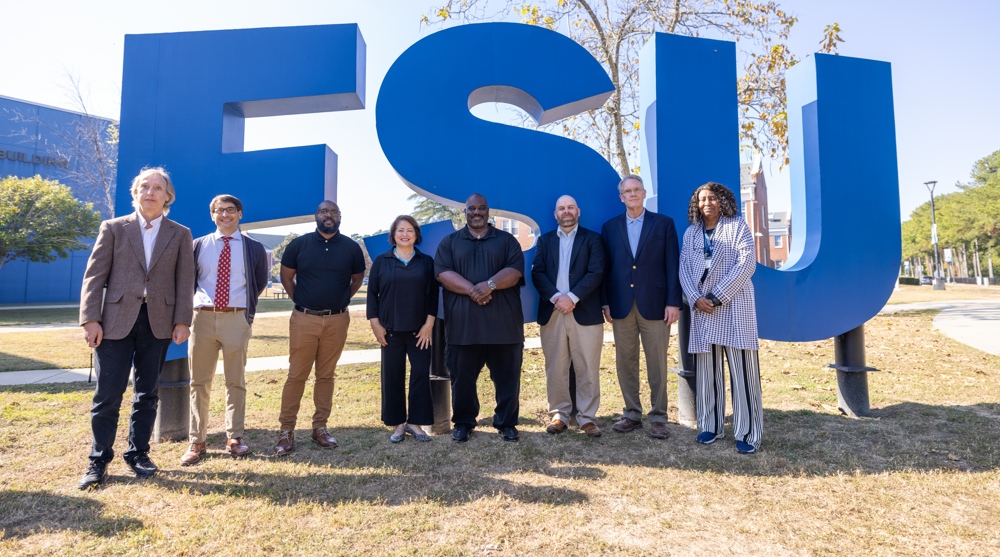History (BA)

History Faculty: L-R: Dr. Maurice Adkins, Dr. John Brooks, Dr. Robert Taber, Dr. Bradley Kadel, Mr. Charles Anderson, Dr. Linda Tomlinson (IGPH Dept Chair), Dr. Kelli Cardenas Walsh, Dr. Sidney Pash
 There is an Online Degree Completion (ODC) Option Available. Click to learn more.
There is an Online Degree Completion (ODC) Option Available. Click to learn more.
FSU’s online degree completion programs allow you to complete your upper-division (junior and senior level) courses online. To be admitted to an ODC program, you must already have completed the University College Core Curriculum (General Education Requirements) or be dual enrolled with a partnering community college. A partnering community college is a community college in which there is a signed articulation agreement between FSU and the community college.
We hold the past as an important source of information that will inspire you on your quest for an enriched and enlightened future.
Students who are interested in studying world events -- whether they are past or present -- are invited to become History Majors at Fayetteville State University. The History curriculum was carefully designed to prepare scholars to function effectively in the twenty-first century. Our long-range goal is to provide the benefits of a quality education in the form of courses offered at the University as well as to produce trained professionals who will serve the surrounding community.
Why Choose History?
Historical knowledge is powerful tool for the 21st century. History increases cultural literacy and sensitivity. You will learn to consider multiple points of view and changing global contexts. It also offers a unique education in the curation of content, teaching you how to collect, evaluate, and arrange a variety of sources into persuasive arguments and narratives. By interpreting the past you will better understand yourself. And those who know their history help to shape how people see themselves in the present and what they hope for the future.
As a history major, I discovered the possibilities of jobs in museums, tour guides at local battlefields, and working in the archives.
What Will You Learn?
The History Program at FSU provides students with classes needed to fulfill requirements in the core curriculum in addition to requirements for the History major. The History Program also offers classes in United States, World, African American, European, Diplomatic, Latin American and Military History.
To learn more about program requirements and course specifics visit the FSU Undergraduate Catalog.
What Will You Do?
Career fields for history majors beyond the classroom include but not limited to: communication, information management, advocacy, business, law, museums, archives, publishing, preservation, consultants.The History Major will find a wide range of career opportunities upon graduation. As a History Major, students will learn historical inquiry, research, and analytical/critical thinking skills across timelines and borders.
- Elementary Schools
- Secondary Schools
- Postsecondary Education
- Historic Sites and Museums
- Museums and Historical Organizations
- Cultural Resources Management and Historic Preservation
- Think Tanks
- Writers and Editors
- Journalists
- Documentary Editors
- Producers of Multimedia Material
Historians as Information Managers
- Archivists
- Records Managers
- Librarians
- Information Managers
- Lawyers and Paralegals
- Litigation Support
- Legislative Staff Work
- Foundations
Historians in Businesses and Associations
- Historians in Corporations
- Contract Historians
- Historians and Nonprofit Associations
The Area of History at Fayetteville State University takes its responsibilities and commitments seriously in facilitating the development of quality-learning for citizens of southeastern North Carolina and surrounding areas. We hold the past as an important source of information that will inspire our quest for an enriched and enlightened future. History teachers provide the means for accessing this information through the use of techniques involving research, analysis, and synthesis. Through its diverse course offerings which include United States History, African-American History, Asian History, European History, African History, Latin- American History, World History, etc., the Area of History seeks to be thorough in its coverage of global societies.
